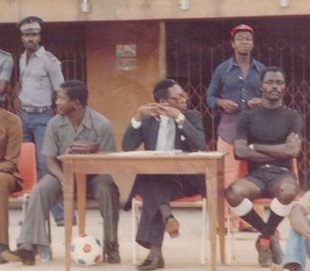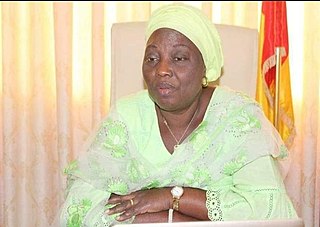
Conakry is the capital and largest city of Guinea. A port city, it serves as the economic, financial and cultural centre of Guinea. Its population as of the 2014 Guinea census was 1,660,973.

Ahmed Sékou Touré was a Guinean political leader and African statesman who was the first president of Guinea from 1958 until his death in 1984. Touré was among the primary Guinean nationalists involved in gaining independence of the country from France. He would later die in the United States in 1984.

Islam is the main religion in Guinea, followed by an estimated 90% of the population as of 2022. "Most are Sunnis who follow the Maliki legal tradition and Qadiri and Tijani Sufi orders."

Saifoulaye Diallo was a Guinean politician, lawmaker and cabinet member.
Balla et ses Balladins was a dance-music orchestra formed in Conakry, Guinea in 1962 following the break-up of the Syli Orchestre National, Guinea's first state-sponsored group. Also called the Orchestre du Jardin de Guinée, after the "bar dancing" music venue in Conakry that still exists today, the group made a number of recordings for the state-owned Syliphone label and become one of the first modern dance musical groups in Guinea to use traditional musical instruments and fuse together traditional Guinean folk music with more modern influences.
Camp Boiro or Camp Mamadou Boiro (1960–1984) is a defunct Guinean concentration camp within Conakry city. During the regime of President Ahmed Sékou Touré, thousands of political opponents were imprisoned at the camp. It has been estimated that almost 5,000 people were executed or died from torture or starvation at the camp. According to other estimates, the number of victims was ten times higher: 50,000.
Trade unions in Guinea were historically important - having played a pivotal role in the country's independence movement - and in recent years have again assumed a leading role.

Ismaël Touré was a Guinean political figure and the half brother of President Ahmed Sékou Touré. He was the chief prosecutor at the notorious Camp Boiro.
The Cabinet of the First Republic of Guinea was the governing body of Guinea from independence on 28 September 1958 until the death of President Ahmed Sékou Touré on 26 March 1984, followed by a bloodless coup by Colonel Lansana Conté on 3 April 1984. For much of that time, the country was run by a tight-knit inner group, many of them relatives of Sékou Touré, who became the primary beneficiaries of the regime.

Lansana Diané was a general and a minister in the cabinet of Ahmed Sekou Touré, President of Guinea during the First Republic (1958–1984). The military government that took power after Touré's death executed him in 1985.

Siaka Touré (1935–1985) was the commandant of Camp Boiro in Conakry, Guinea during the regime of Guinean President Ahmed Sékou Touré. During this period, many of the president's political opponents died in the camp.
The Ignace Deen Hospital is a hospital in Conakry, Guinea built during the colonial era. The hospital is situated next to the National Museum.

The Donka Hospital is a publicly owned hospital in Conakry, Guinea. It has inadequate facilities to handle demand, and many Guineans cannot afford its services. More than once in recent years the hospital has had to deal with a major influx of patients wounded in civil disturbances.
Aboubacar Demba Camara was a Guinean singer and songwriter. He led the band Bembeya Jazz National from 1963 until his death.
The following is a timeline of the history of the city of Conakry, Guinea.

Mory Sinkoun Kaba, known as Kaba Mory or MS, was a Guinean businessman and philanthropist. Close to president Sékou Touré, he realised numerous state projects on his behalf.

Guinea–Spain relations are the bilateral and diplomatic relations between these two countries. Guinea has an embassy in Madrid and honorary consulate in Barcelona, Las Palmas de Gran Canaria and Valencia. Spain has an embassy in Conakry.

Mafory Bangoura was an activist for an independent Guinea, and post-independence a politician holding the post of Minister for Social Affairs in the 1970s. Known as the 'Women's President of Guinea', her portrait featured on the one syli banknote, issued in 1981.

Aminata Touré was a Guinean politician. She served as mayor of Kaloum from 2018 until her death in 2022.















